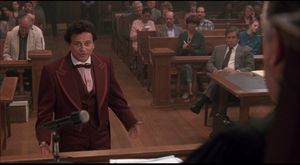
This case is about a tragic accident. An honorable man, distracted by uncharacteristic personal troubles, took less care than usual with his gun and tragically paid with his life . . .
As I deliver my closing arguments before my Trial Advocacy class, I might as well be on stage. Though my hand is faintly trembling, I try to project confidence and conviction in my posture and tone of voice. I recall countless lessons I delivered before New York City students, likewise trying to command a room with my presence and oratory.
When I reach the end of my speech, I gaze into the eyes of my faux jury members and speak slowly and deliberately:
Make the insurance company play by the rules like the rest of us. Return a verdict for the plaintiff in the amount of $500,000. Thank you.
The curtains rise, the lights turn on, and the audience stands amidst thunderous applause!
Okay, that doesn’t happen. But the class does clap for me, and even though this is only an in-class exercise, I feel the thrill of performing. This, I tell myself, is the kind of lawyering I want to do at some point in my career, the kind of verbal argumentation many of us imagined when we applied to law school.
Indeed, in Trial Advocacy we have learned and practiced the nuts and bolts of trial litigation, the bread and butter of every TV and Hollywood crime drama: opening statements, direct examinations, evidentiary procedures, objections, cross examinations, and closing arguments. In addition to studying and role-playing our new skills, we have watched videos of real lawyers displaying these techniques, including excerpts from the famous William Kennedy rape trial.
These dramatic lessons serve an immediate purpose for those of us participating in the Civil Litigation and Criminal Law clinics. In two weeks, I will apply what I’ve learned by representing a client in an eviction hearing in Boston Housing Court. As a law student attorney, authorized to practice under SJC Rule 3:03, I will stand up in court to argue motions and defend my client against eviction proceedings, unless I can settle with the opposing counsel before trial.
In either event, I am excited and humbled by my responsibility. While I would love to stand up in court for the first time, I would love even more to achieve the best possible outcome for my client and his housing situation. I am a law student, but in this context, I am first and foremost a zealous advocate for my client.
